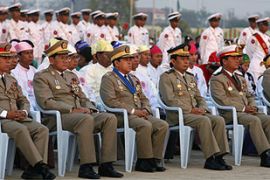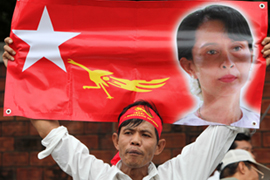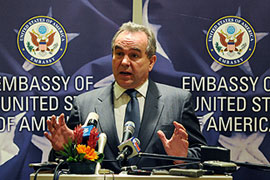Suu Kyi condemns Myanmar poll law
Opposition leader “surprised but undaunted” by “unjust” rules to keep her out of polls.

Nyan Win, a spokesman for her National League for Democracy (NLD) party, said on Thursday that she had called for a strong response from supporters but has not yet specified what they should do.
Opposition challenges
“[She] said she never expected such repressive laws would come out but said she’s not disappointed,” he told reporters after meeting the Nobel laureate at her home on Thursday.
 |
| Aung San Suu Kyi called for a strong response from supporters against the new laws [EPA] |
“She said such challenges call for resolute responses and calls on the people and democratic forces to take unanimous action against such unjust laws.”
This year’s elections are part of the junta’s long-announced “roadmap to democracy”, which critics deride as a sham designed to cement the military’s power base.
A military-backed constitution was approved by a national referendum last May, but the opposition charges that the vote was unfair.
An election law announced on Wednesday prohibits anyone convicted of a crime
from being a member of a political party, making Aung San Suu Kyi ineligible to become a candidate in the elections, or even a member of her own NLD party.
Two other laws unveiled a day later take away her right to vote, saying those convicted of crimes are barred from the polls.
They also formally invalidated the 1990 election results, saying the 1989 election law under which those polls were held will be repealed by the new legislation.
‘Systematic abuses’
Meanwhile, a UN special envoy for human rights in Myanmar called for an investigation into possible war crimes and crimes against humanity by the military government, based on a report following a tour of the country last month.
|
“[The] violations “are the result of a state policy that originates from decisions by authorities in the executive, military and judiciary at all levels” Tomas Ojea Quintana, UN special envoy for human rights in Myanmar |
Tomas Ojea Quintana in a draft report to the UN Human Rights Council said there was an indication that a “systematic violation of human rights” in Myanmar was the result of state policy.
“According to consistent reports, the possibility exists that some of these human rights violations may entail categories of crimes against humanity or war crimes under the terms of the statute of the International Criminal Court,” said the report.
Quintana said the violations “are the result of a state policy that originates from decisions by authorities in the executive, military and judiciary at all levels”.
Among them were the recruitment of child soldiers, discrimination against the Muslim minority in northern Rakhine state and the deprivation of basic rights to food, shelter, health and education, which he said had continued unabated for years.
The report will be examined in Geneva on Monday.
Highlighting abuses
Myanmar pressure groups hailed the UN rights report saying they hoped to see an inquiry held without further delay.
 |
| Kurt Campbell said the new laws are “disappointing and regrettable” [AFP] |
“This is the time for action,” said Aung Din, executive director of the US Campaign for Burma, as Myanmar was formerly known.
“This is the first time in the nearly 20 years of UN involvement in my country that an UN official made a credible, meaningful and important recommendation to help transform the situation in Burma.”
The US State Department in a separate report released on Thursday highlighted Myanmar’s “severe human rights abuses”, including deaths in custody, rape and torture.
The department’s annual report said Buddhist monks were subjected to particularly “cruel treatment” including beatings, due to the role the clergy played in the bloody pro-democracy protests in 2007.
On Friday Kurt Campbell, the US assistant secretary of state, said the administration’s new policy of engagement appears to be failing in view of the restrictive elections laws.
Speaking in Bangkok, Campbell said Washington’s approach was to “encourage domestic dialogue between the key stakeholders” but the ruling military’s recent announcements on elections restrictions are very disappointing.